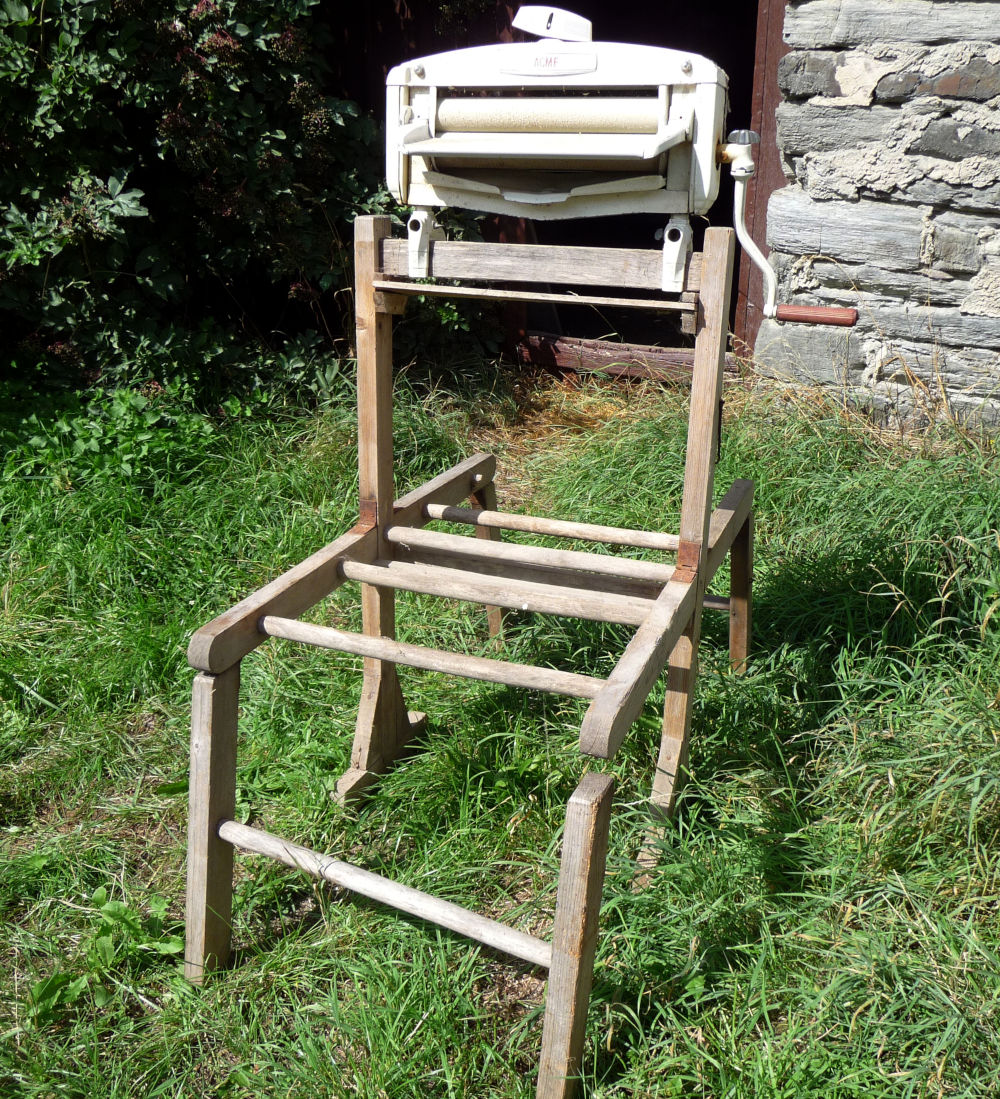Off-grid washing machine
Is it more sustainable to wash with a foot pedal washing machine? Let me say right away: 80% of all energy that a washing machine costs is in heating the water. If you do not obtain your hot water from a sustainable source, you will be without electricity with a hand wash or a hip washing machine is just as durable as an average washing machine.
During the course Self-sufficient Off-grid many topics are casually covered briefly, and the washing machine is there one of. In this article I do not only look at energy consumption (as is socially and politically usual), but I look at all components. By looking at the big picture, I hopefully avoid choosing an alternative that is not more sustainable.
Detergent
I wrote a blog about detergents. In fairness, the total impact of care products across the entire bathroom is only 3%, or negligible. You are more sustainable by eating less meat. Of course you save some plastic waste, deforestation (by palm oil), chemical pollution and money, but it feels very good by using more sustainable products.
Water
An average washing machine quickly uses 55 liters per wash, and a very efficient 40 liters. That is not much in terms of your total consumption per person per day, but it is different if you live off-grid (such as in a tiny house) and use rainwater. Suppose you collect an average of 60 liters of rainwater per day: then it pays to look at alternatives. With a hand wash, for example, you use four times less water than a washing machine. Fortunately, rainwater does not have to be filtered very intensively in order to wash clothes with it.
Heat
As mentioned, most of the energy is in heating the water. A 40 degree wash costs a washing machine approximately 500 Wh and a 60 degree wash 900 Wh. Off-grid you must of course have the electricity for that (that explanation is another story, in my course you get a standard calculation). All washing machines heat the water electrically, which is the most inefficient way of heating. You can heat water sustainably in various ways, for example with a solar boiler (or heat pump). You can then buy a hot fill. Hotfill is not a sex position but a washing machine with a hot water connection. They are not very popular, because they are hardly for sale.
Washing machine
The washing machines are discussed in the next section. First a side note: a washing machine has to be produced, and this requires raw materials such as steel, some heavy metals for electronics and concrete. And after use, it ends up on the lap heap. The number one ecological impact of western people is therefore "stuff" and not "meat" or "transport" (these are number 2 and 3). If your washing machine is broken, have it repaired before buying a new one.Do you always do your laundry at a fixed time of the week? Try doing a full load on your own. This saves a lot of emissions and money. As a student, this was once the reason for me to buy more socks: I ran out of clean socks before I had a full wash.
Spin and spin
With regard to spinning and spinning, a hand wash is an obvious choice, which is especially relatively fast if you have a lot of laundry. And: the more low-tech, the less can break. Five years ago I bought a post-war hand washing machine. Below you can see how that works. The wringer is especially great.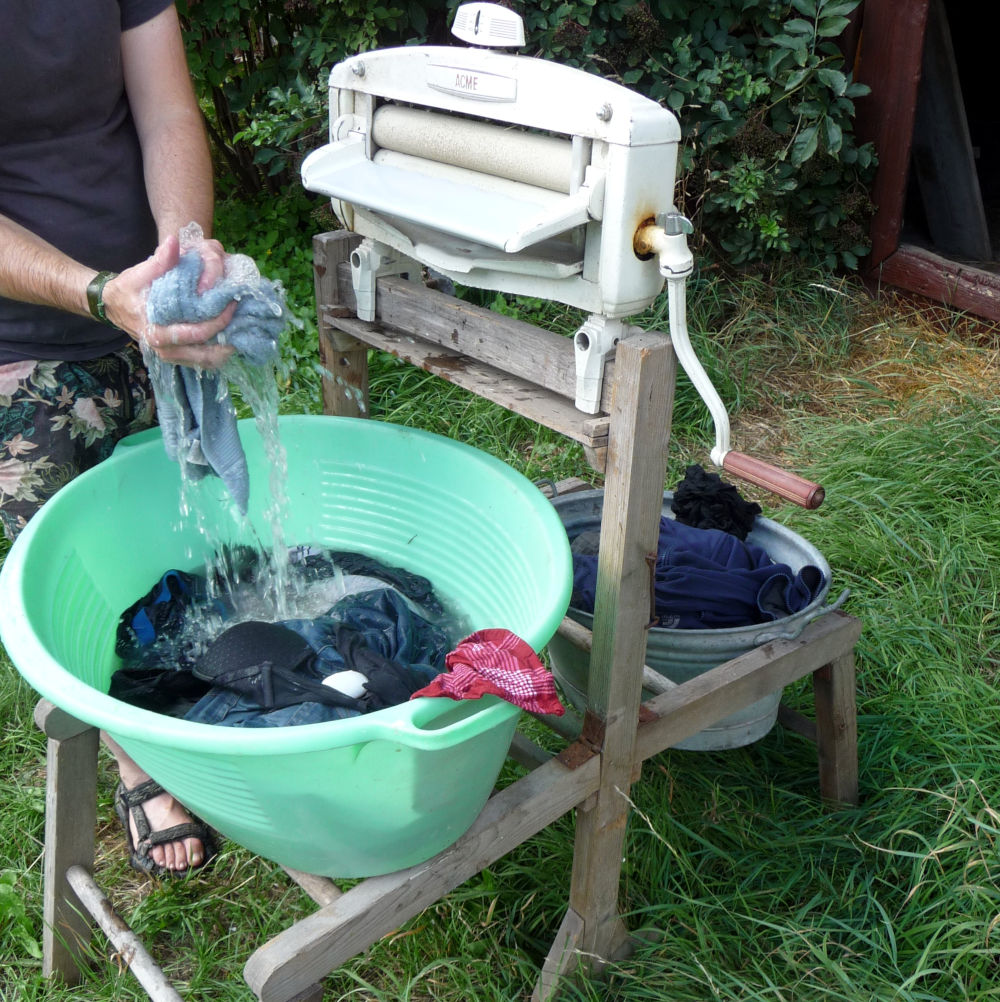
First rinse with water and then: just wash with a block of hand soap! And rinse afterwards.

The wringer extracts a lot of water.

The water jumps and splashes out in thick layers.

In the shed (classroom) a very long washing line was quickly hung up.
You can of course do the laundry with the help of some mechanics. This saves back pain and joint complaints in hands and arms. Although I doubt that this will prevent many complaints, hand washing machines are popular, such as the WonderWash and The Laundry FOD.
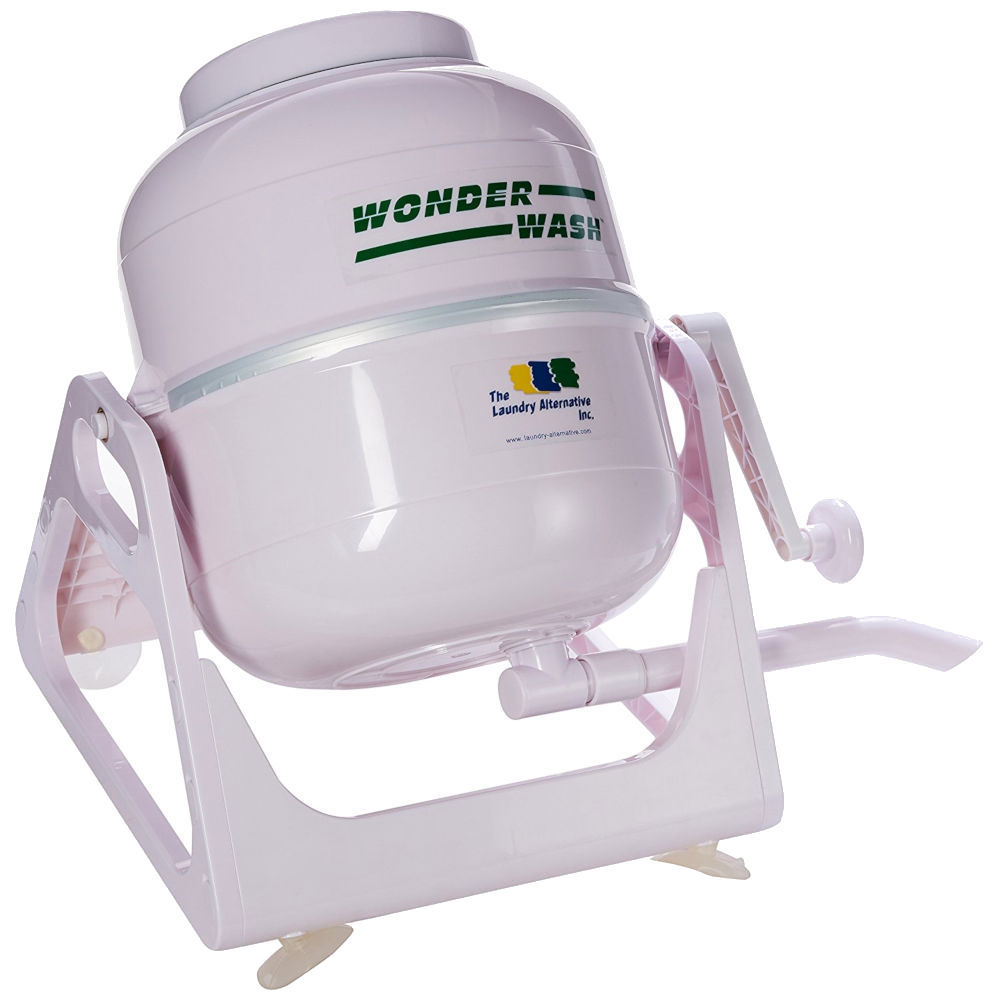
The hip WonderWash
Of course you can also drive a washing machine with your feet. On the internet you can find many examples of people who tie a barrel on the back of their bicycle, and then do the laundry by cycling. Without a bicycle, there are also the foot pedal washing machines. The Drumi is very hip, and the concept is also known as Gira Dora in developing countries.
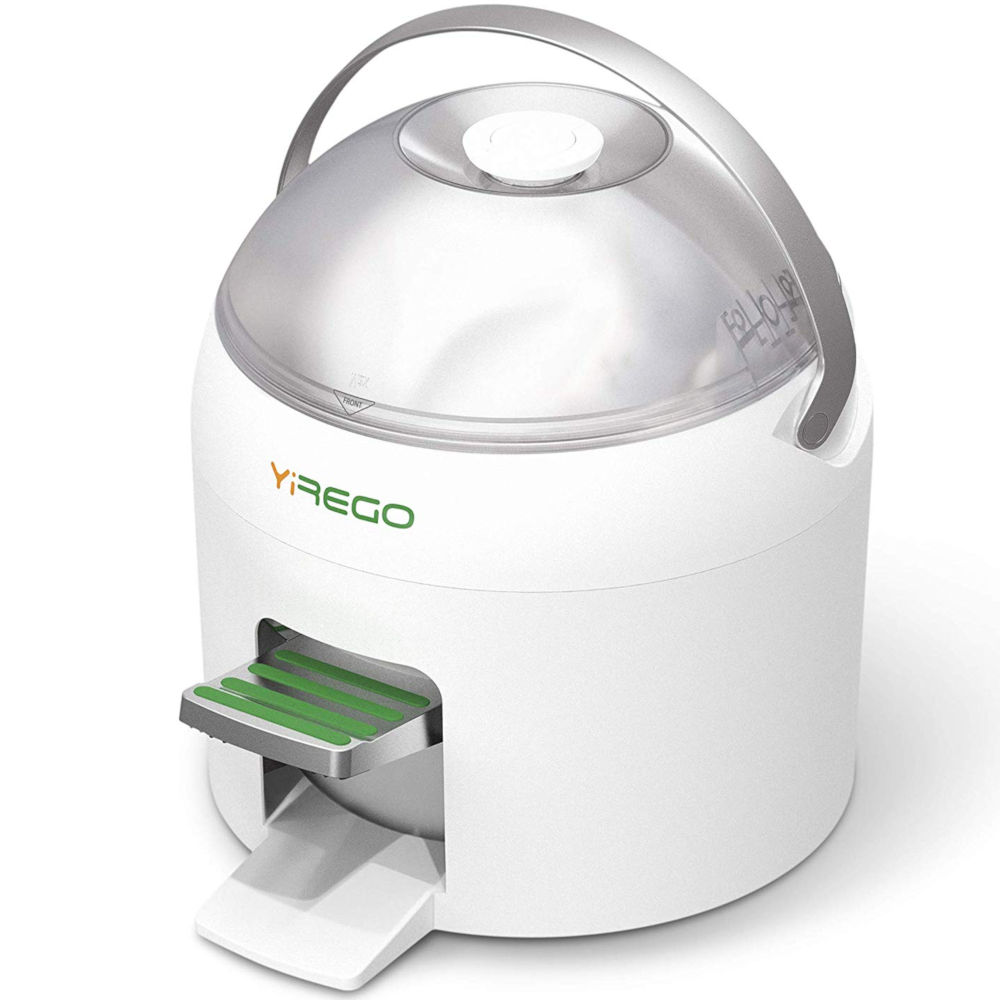
The Yirego Drumi
Washing with an electrical appliance is even more luxurious. There are small washing machines ("up to 5 kilos") at camping shops and even the Blokker Gamma and on the 2ndhanded marketplace. These usually don't heat the water, so you have to put hot water in them when you start. These usually spin moderately (300 rpm vs. usual 1400+ rpm), sometimes have a separate spin drum, and if there is one drum, this spin speed is usually achieved with only a quarter of the wash. In terms of content, it is often a maximum of 3 kilos of washing content (compared to the usual 7 to 10 kg), and a separate drum for centrifuge. These are the electric washing machines you can choose from if you live off-grid, and if you buy a stand out (such as one that spins well or grabs tap water for rinsing) it actually works really well.
I'm a fan of the Movewasser 1, and here's a list of why I find this washing machine so handy. This allows you to compare yourself with other camping models that are for sale. I'm so happy with it because
- this only 180 Wh is used per wash (measured myself), and is therefore OK for off-grid (in any case, your battery will not warp immediately). The most efficient regular washing machines consume about 900Wh per wash (source: tweakers.net). I get hot water from the solar boiler system, so almost directly from the sun. If you don't have that: -again- make sure that 80% of your energy consumption is in heating the water.
- There is a centrifuge in it that also works fine.
- for spin the laundry stays in the same drum, and it reaches the spin speed with the total drum volume (that's unique)!
- it can hold slightly more than 3 kilos of laundry, namely 3.5 kg. That's not much, but it works. Camping washing machines from Blokker or Gamma can handle 4.6 kg, and on syntrox.de there are 7 to 9 kg.
- the most important thing: it automatically takes tap water (or you pour water in it when it beeps if you don't have a connection (yet)) for rinsing. So no hassle with draining water a few times and putting water in again (pffffff).
Update: he will be back in the Netherlands
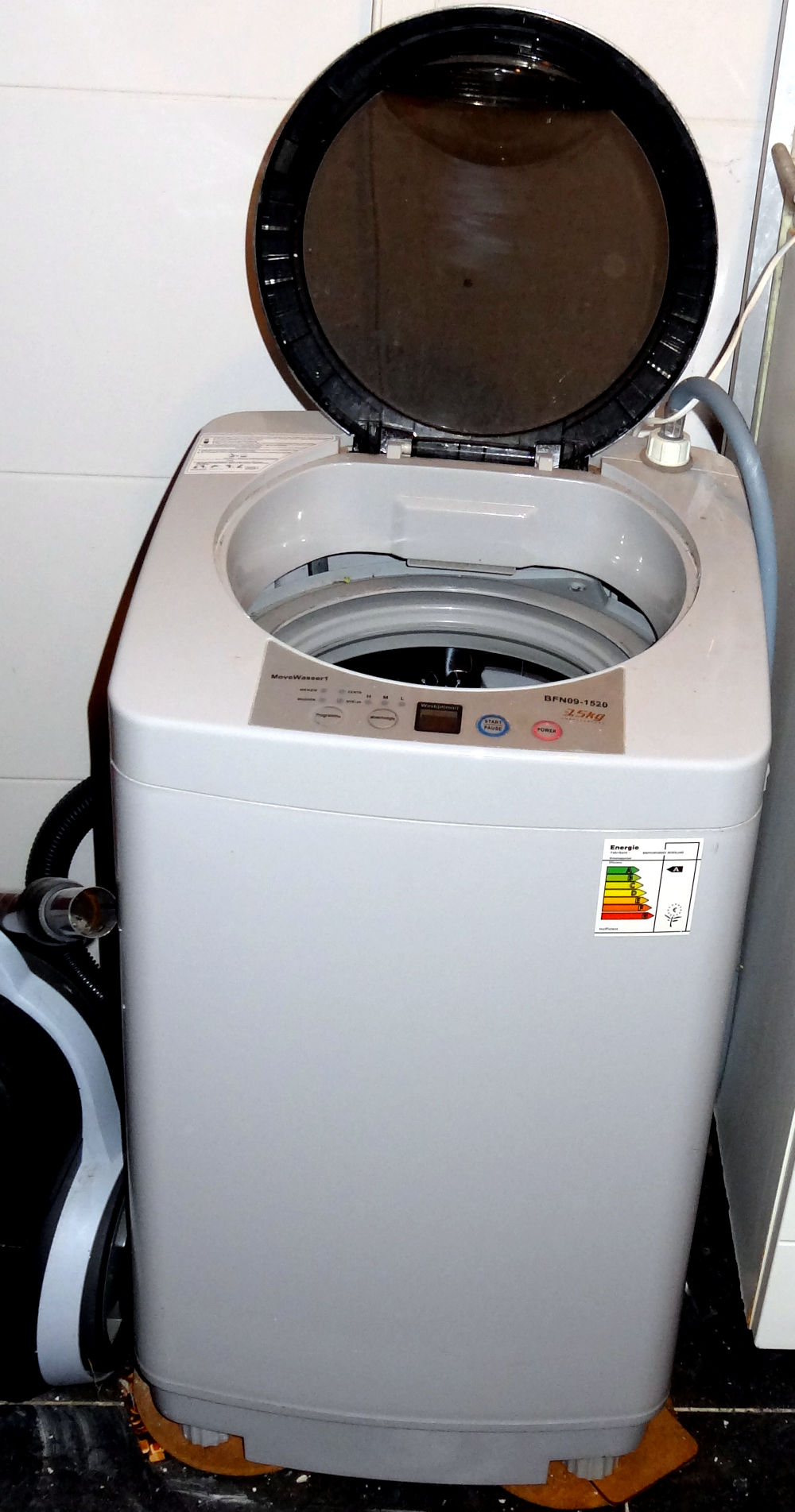
De Movewasser 1
Check out our popular course Selfsufficient Off-grid.
